Will BERSIH TAKE THE LEAD AND ORGANIZE A PEACEFUL ASSEMBLY because of the growing disappointment with PM Anwar Ibrahim's slowness or U-turns on institutional and other reforms expected when PH comes into power?
Many Malaysians are likely not participate in peaceful assemblies organized by political parties or coalitions, but it is different when BERSIH or other bodies other than those related to political parties do. Hence, BERSIH has the capacity to draw the crowds, irrespective of party affiliations. A DAP supporter may not participate in a protest organised by PN eventhough he/she supports the call, but would participate if it was BERSIH or some non-party partisan groups is organizing.
But, sadly some believe that BERSIH and many other human rights groups were 'compromised' after GE14 - unwilling to protest against PH >>> always talking about 'giving more time' even in the face of obvious wrongs committed that angers justice loving persons.
Even now, after the recent discontinuance of Zahid Hamidi's criminal case, Najib's pardon, etc - BERSIH is still waiting 'giving more time' - 'ready to organise another mass
demonstration against the government if it does not take concrete steps
to implement promised institutional reforms in the coming parliamentary
meetings.' HOW LONG BEFORE BERSIH MOVES? Is BERSIH still independent, or is it sympathetic to Anwar Ibrahim, a former ABIM leader?
Muhammad Faisal Abdul Aziz has been elected as the new Coalition for Clean & Fair Election (Bersih) chairman for the 2023-2025 term... Muhammad Faisal was the former president of the Muslim Youth Movement Malaysia (Abim) from 2019 to 2023 and deputy chairperson of Bersih from 2018 to 2020.
How many Parliamentary meetings...until the end of this government's term in office?
If BERSIH has no intention to organise a peaceful assembly - do not deceive the public...and maybe others will take the initiatives..A peaceful assembly's timing - best after something that angers the public, and Najib's pardon was such an event - it will be ineffective to wait several months for the issue may be 'forgotten' like Zahid's DNAA has become,...SO, BERSIH SHOULD DO IT NOW AND NOT WAIT ANYMORE..
Many in Malaysia are waiting for the opportunity to express their unhappiness or 'disappointed' with the Malaysian government, now under the premiership of Anwar Ibrahim and his PH led government...
Anyway, with the draconian Peaceful Assembly Act still in place - will BERSIH even be allowed to organize a peaceful assembly at the Dataran Merdeka, etc > or will they be forced to do in in some closed stadium or in some field far away from the public eye? I wonder...I wonder...
Sadly, often they cannot hope for their 'elected representative' MPs to raise their issues, especially if it a criticism of current government policies and practices - because most PKR,DAP,Amanah or UPKO MPs appear just too 'afraid' to express views publicly that are critical of PM Anwar(also the Chairperson of PH) or his government >>> for the worry is that if they do, they may be 'penalized' by the party or get in the 'bad books' of ...
Despite Anwar's government backtracking on election promises or party promises, how many PKR, DAP or Amanah MPs even spoke out about SOSMA, Sedition Act and its continued usage...
MPs - they are in name, but their failure to SPEAK OUT publicly their views and the people's concerns especially if it is against Anwar or their own political parties is disturbing...
So, who speaks for the people of Malaysia? Sadly, for many - it goes back to the people themselves to speak out for themselves...
Going into GE15, many people voted against BN and voted for PH. But, then PH formed a coalition government with the 'enemy' BN, and BN/UMNO leader the Deputy PM position, and even made one of the BN leaders the Deputy Finance Minister...Well, it is true that PH had little or no choice after PN decided that it will not form a unity government with PH, and the Sarawak/Sabah MPs also did not. Left with no choice, PH formed a coalition government with BN...maybe the only option between becoming government or remaining Opposition. Such coalition with 'enemy' is common place in many jurisdictions.
BUT, then when it came to the subsequent 6 State elections, PH formed an electoral pact with BN - when, it would have been best to contest the said State elections alone, and after the results came out decide whether to form a coalition government with BN or any other party IF AND ONLY IF PH failed to win sufficient seats to form government on its own.
Hence, what the PH did could be seen as a 'BETRAYAL' of the people - something that warrants the immediate resignation of all PH MPs - If GE was held today, will PH still have the support of the people and win the majority of seats again?
The new 'unity government' has since then abandoned a lot of REFORMS that was expected by PH - none of the bad laws like Sedition Act, SOSMA, Detention Without Trial laws, etc were even repealed, let alone amended after all this time to remove the draconian provisions contained there in. Local Government(Council) election promise was 'forgotten' ...
Then, recently we had the pardon of Najib, the discontinuance of criminal case against Zahid...
Of course, the people may have much grievances against PM Anwar Ibrahim and his government...and one way that they can really express their grievances, expectations,..is maybe through a PEACEFUL ASSEMBLY ... and so, there is likely to support when BERSIH said it was planning or rather contemplating the holding of a PEACEFUL ASSEMBLY (so, is it all talk by BERSIH).
BERSIH in the past had demonstrated that it had the capacity to get tens of thousands, hundreds of thousands to participate in peaceful assembly...
BUT post GE14, BERSIH suffered a loss of credibility - when its leader was co-opted to contest as a PH MP(who was then dropped come GE15), and other key personalities were given government or PH-linked positions. The result was BERSIH's image - it was seen as a pro-PH movement. It must dispel such perception and reclaim its image as an independent pro people movement...not a 'tool' of any political parties. Can it?
BERSIH's ability to get peoples' support was because it was seen to be independent of political parties despite the fact that many Opposition parties grabbed the opportunity to subsequently support these BERSIH organized peaceful assembly...
Bersih has not invited Perikatan Nasional (PN) to join in protesting the reduced sentence for former prime minister Najib Razak, says coalition secretary-general Hamzah Zainudin...When asked if PN would join the electoral watchdog at such demonstrations, Hamzah said both parties must first discuss the issues they should collectively fight for.It was absurd for PN to suggest that it will not support a BERSIH protest unless 'both parties must first discuss the issues they should collectively fight for.' BERSIH can invite views from all quarters, including political parties but ultimately BERSIH must independently act...of course inviting all, persons and parties to join...
Remember, the people are not just unhappy with PH-led unity government but also some of the matters in PN governed states - or just positions taken by some political parties and/or politicians.
PN can organize its own peaceful assembly and determine the issues they fight for in their peaceful assembly - WHY DON'T THEY? Sadly, many political party simply is not confident enough that they can attract Malaysians from all walks of life, religion, ethnicities, etc to come out for a peaceful assembly...NO GUTS. Even the government fears that they will not get the peoples' support if they organize a peaceful assembly - so, even such an assembly is heard, we hear rumours of people being 'paid' to attend, 'ordered' to attend...
BERSIH organised peaceful assemblies according the people the ability to express their many grievances against the government - but there has been NO BERSIH organised peaceful assemblies after GE14, after PH became government ousting the BN rule and domination of the Federal Government. The last big BERSIH Protest happened on November 2016.
The rally highlighted five demands: clean elections, clean government, strengthened parliamentary democracy, the right to dissent, and empowerment for Sabah and Sarawak under the tagline “Satukan Tenaga – Malaysia Baru” (“Stand United – New Malaysia”).
The demands are still valid in 2024 - Will BERSIH act and lead? Will they organize a PEACEFUL ASSEMBLY ...
Bersih warns Putrajaya of fresh protest unless reform agenda put back on track
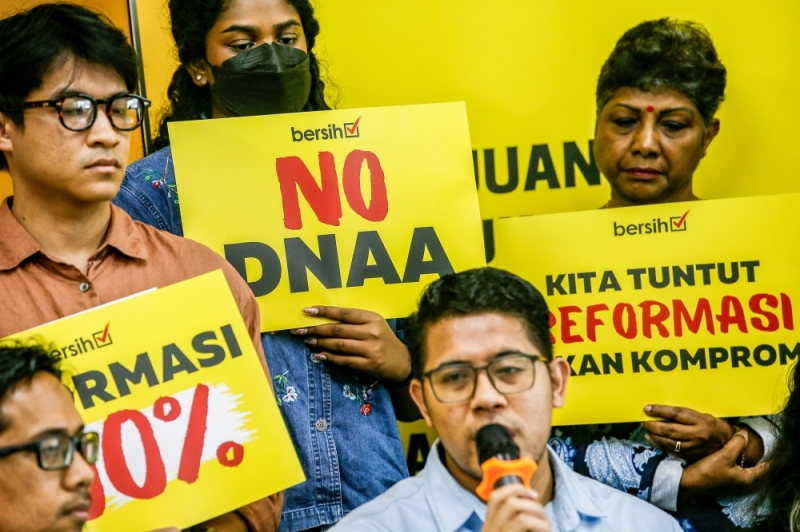
PETALING JAYA, Feb 7 — The Coalition for Clean and Fair Elections (Bersih 2.0) today told Putrajaya that it was ready to organise another mass demonstration against the government if it does not take concrete steps to implement promised institutional reforms in the coming parliamentary meetings.
Bersih demanded that the government begin delivering on the reforms promised during the 15th general election in 2022, including the separation of the attorney general’s functions and the restoration of Parliament’s independence from the executive.
“The people urge the government to implement the 100 per cent reform agenda without compromise.
“Bersih will not hesitate to mobilise the people to take to the streets as this is the language best understood by those comfortably in power, regardless of the various excuses given,” said Bersih chairman Faisal Abdul Aziz in a press conference here today.
Faisal said the government must implement these reforms as they were promised the election manifestos of the coalitions that were now in power.
He added that the priority was for structural reforms, and that his organisation would closely monitor the next parliamentary meeting for progress on these promises.
Faisal said Bersih was issuing this warning due to recent developments that show the derailment of the reforms agenda.
Bersih and other NGOs present at the press conference expressed their disappointment with the government’s failure to reveal the advice submitted to the Pardons Board on Datuk Seri Najib Razak’s pardon application as well as the discharge not amounting to acquittal (DNAA) given to Deputy Prime Minister Datuk Seri Ahmad Zahid Hamidi for his corruption charges after the courts had determined prima facie.
Faisal said that while there is no legal obligation for the government to explain, it still has a moral responsibility to do so in matters that were of significant public interest.
Aliran executive committee member K. Haridas clarified that the public were not questioning the Yang di-Pertuan Agong’s discretionary powers enshrined in the Federal Constitution, but rather the government’s advice on Najib’s pardon application.
Suara Rakyat Malaysia (Suaram) program director Azura Nasron complained of the lack of transparency in the matter, asking why Najib’s application was expedited over those of death row inmates made previously.
Electoral watchdog Bersih has organised five massive protests considered to be inflection points in the evolution of Malaysia’s political landscape, beginning with the first in 2007 - Malay Mail, 7/2/2024
Hassan backs Bersih’s call for protest, says reforms taking too long
Pasir Gudang MP Hassan Karim says the slow pace of reforms has left the people disillusioned and disappointed in the unity government.
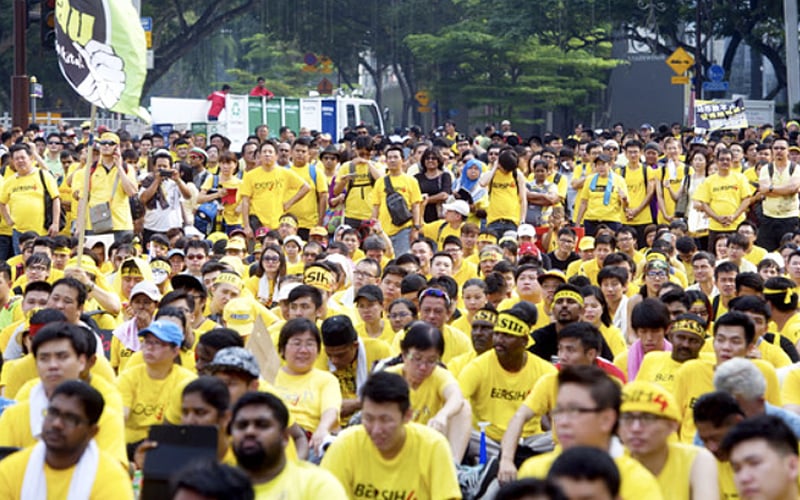
PETALING JAYA: PKR veteran Hassan Karim says Bersih should take to the streets to protest the sluggish pace of reforms under Prime Minister Anwar Ibrahim’s leadership.
The Pasir Gudang MP said the issue has left the people disillusioned and disappointed in the unity government.
“So it is only natural if Bersih decides to take to the streets to voice their protest against Pakatan Harapan (PH) and the government under Anwar’s leadership for their failure to implement the changes as promised,” he told FMT.
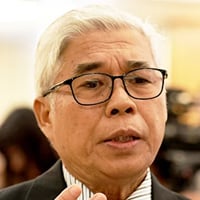
Last Wednesday, Bersih warned that it would not hesitate to organise street protests again if the government does not commit to its institutional and political reform agenda.
At a press conference, Bersih chairman Faisal Abdul Aziz said Malaysia was in a critical period of “democratic transition” that required the coming together of all parties to realise reforms.
“Bersih will not hesitate to mobilise the people back to the streets, a ‘language’ comprehensible to those in power who have been dismissing the people’s aspirations with excuses against supporting reforms. We urge the government to implement the reform agenda without compromise,” he said.
Faisal also said the handling of recent corruption cases involving political elites, including former prime minister Najib Razak, had left the public as well as civil society organisations disappointed and angry.
However, government spokesman Fahmi Fadzil said the government has never forgotten about the institutional reforms it once promised, adding that it is one of the main agendas pursued by Anwar’s administration.
Hassan said Bersih’s fight for free and fair elections also included demands for reforms as pledged by PH in their election manifesto.
The people have very high hopes for the reforms promised, he added.
Hassan pointed out how between 2018 and 2020, the previous PH government led by former prime minister Dr Mahathir Mohamad had also failed to implement the promised reforms, with the latter claiming that the PH manifesto was “not a bible”.
“So when Anwar, a leading advocate for reform and who spearheaded the movement back in 1998, became prime minister, of course people anticipated the promised reforms, but more than a year into the Anwar administration, reforms are progressing too slowly,” he said.
Bersih has been holding protests since 2007 to shine a light on
alleged electoral malpractices and to push for fair elections. It also
held rallies in 2015 and 2016 over the 1MDB scandal. - FMT, 9/2/2024
Thousands gather for Zahid DNAA rally despite police warnings
The participants then head to the Dang Wangi police headquarters to lodge a report.
Crowds today gathered for the "Save Malaysia" rally in Kampung Baru, Kuala Lumpur, to protest the attorney-general's decision to halt the corruption trial of Deputy Prime Minister Ahmad Zahid Hamidi.
Dressed in white, they gathered at the Kampung Baru mosque after the afternoon prayer, carrying placards calling for the Umno president to be re-prosecuted.
They then began moving to the Dang Wangi police headquarters, where a police report will be lodged by the organiser's secretariat, Tun Faisal Ismail Aziz.
Those in attendance included activist Badrul Hisham Shaharin or Chegubard, who was released following his arrest several days ago, Bersatu information chief Razali Idris, and Pejuang information chief Rafique Rashid.

Tun Faisal earlier said in his speech that no gathering would be held.
"We want to express our desire, guaranteed under the constitution, that there was something amiss when Zahid was given the DNAA," he said, referring to the discharge not amounting to acquittal granted to Zahid for 47 charges of corruption in the Yayasan Akalbudi case.
"Before the election, they promised they would jail Zahid, not put him in Putrajaya." - Malaysia Now, 16/9/2023
After Bersih 5: Fear and Repression Continue in Malaysia
While the latest rally went off peacefully, that should not overshadow an ongoing crackdown.
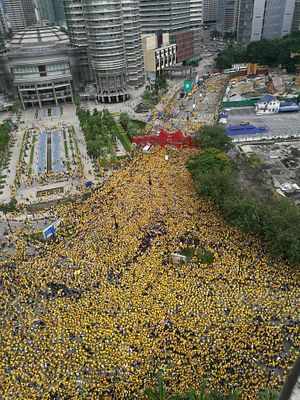
The much-anticipated Bersih 5 rally in Malaysia has finally concluded in a relatively peaceful manner, despite some minor incidents in the evening of November 19 amidst a downpour. Bersih 5 is intended to pressure the government toward a new, reformed Malaysia through institutional changes to the country’s flawed governance system ahead of the 14th General Election, due by 2018. The rally highlighted five demands: clean elections, clean government, strengthened parliamentary democracy, the right to dissent, and empowerment for Sabah and Sarawak under the tagline “Satukan Tenaga – Malaysia Baru” (“Stand United – New Malaysia”).
As investigations on the 1Malaysia Development Berhad (1MDB) scandal continue, Prime Minister Najib Tun Razak’s administration has become increasingly repressive and authoritarian. While Saturday’s rally was overall considered as peaceful — due to the heavy police presence in cordoned-off Kuala Lumpur to prevent a potential clash between the Bersih yellow shirts and Red Shirts — it is not an indication that state repression has decreased.
A day before Bersih 5, there was a series of heavy-handed attempts to intimidate activists and opposition leaders. Fears of clashes between Bersih and Red Shirts were real after the latter threatened to target Bersih supporters. It was a dramatic Bersih eve, with more than a dozen from the Red Shirts and the Bersih group arrested. The pre-rally arrests had the result of causing more fear for potential protesters that intended to participate in the Bersih 5 rally the next day. Many are also angry that Bersih co-chair Maria Chin Abdullah is being held under the country’s anti-terror law, Security Offenses (Special Measures) Act 2012, which allows preemptive detention for up to 28 days.
There were also social attempts to dissuade protesters. Religious authorities told Muslims ahead of the Bersih 5 rally that staging demonstrations would invite foreign intervention and run contrary to Islamic laws. In the Friday sermon prepared for mosques nationwide, the Department of Islamic Development Malaysia (Jakim) highlighted the Islamic way of changing leaders’ faults through advice, prayers, and assisting leaders in virtuous matters.
A day after the rally, Deputy Prime Minister Ahmad Zahid Hamidi announced that more individuals would be arrested. Arguing that the law must be respected, he is reported as saying that a list of individuals involved in the Bersih 5 and Red Shirt rallies have been identified, but the names will not be disclosed.
On the rally day itself, there was a strong police presence on standby, with Federal Reserve Unit (FRU) trucks and lots of barricades. Approximately 7,000 policemen were on duty to ensure security and public order. Water cannon trucks were also deployed. Traffic at 58 roads in seven areas in the city was diverted starting at 7 am on the morning of the rally itself to keep the two rival groups from meeting. he rally organizers’ original plans to convene in Dataran Merdeka for the finale was halted by police as various barricades were erected along main roads leading to the square. Eventually, the organizers made eleventh hour plans to convene the crowd in Kuala Lumpur City Center (KLCC), and the rally was allowed to proceed as planned with no interruption from the police. Former Prime Minister Dr. Mahathir Mohamad turned up unannounced just after 2 pm in Bangsar; this marked his second time participating in a Bersih rally.
According to estimates from the police, there were about 15,000 protesters from Bersih group and 2,500 from the Red Shirts. The online portal Malaysiakini estimated that more than 40,000 protesters marched in the rally organized by Bersih. Malaysiakini estimated the number of Red Shirts who also took to the streets at around 4,000. As the protesters were not allowed to converge at meeting points before they decided to gather at KLCC later in the day, it is difficult to estimate the exact number who turned out.
However, turnout figures are no longer a direct reflection of the support received by Bersih in view of the repressive situation, which does not encourage people to come out and protest without feeling fearful. While some have suggested that political fatigue is setting in among Malaysians, dimming enthusiasm for political rallies, it is equally important to understand that Malaysia does not have an enabling environment for peaceful citizen action.
What could explain the pre-Bersih crackdown this time around is the real fear the government itself has toward citizen action. The much-predicted clash between the red and yellow shirts did not happen, due to the heavy road closures by the police. The police managed to prevent the two groups from clashing; however, in blocking off roads they also impinged on the right of protesters to march peacefully. Although the police were even-handed in their treatment of both groups, the heavy road closures were unnecessary.
While some argue that repression is hinders popular mobilization, due to the added costs associated with mobilizing, others insist that repression potentially increases grievances — which could lead to more united collective action.
This is Bersih’s fifth rally and this year marks the movement’s 10th anniversary. While many have argued Bersih has achieved little in demanding the government make meaningful reforms, one interesting trend that has emerged is that how state repression influences Malaysians’ ability to challenge the government. Although state repression limits protests, over time it has also facilitated the continuing growth of civil society in the country, which then led to the crippling of the government’s political legitimacy.
Najib argued that it is unlawful for any party to try to unseat a democratically elected government via street protests, saying that the people should wait until the next election to choose their government via ballot box. But the crucial issue remains: toppling a democratically elected government and reforming the election process are interlinked issues.
Dr. Khoo Ying Hooi is Senior Lecturer at the Department of International and Strategic Studies, Faculty of Arts and Social Sciences, University of Malaya. - The Diplomat, 23/11/2016
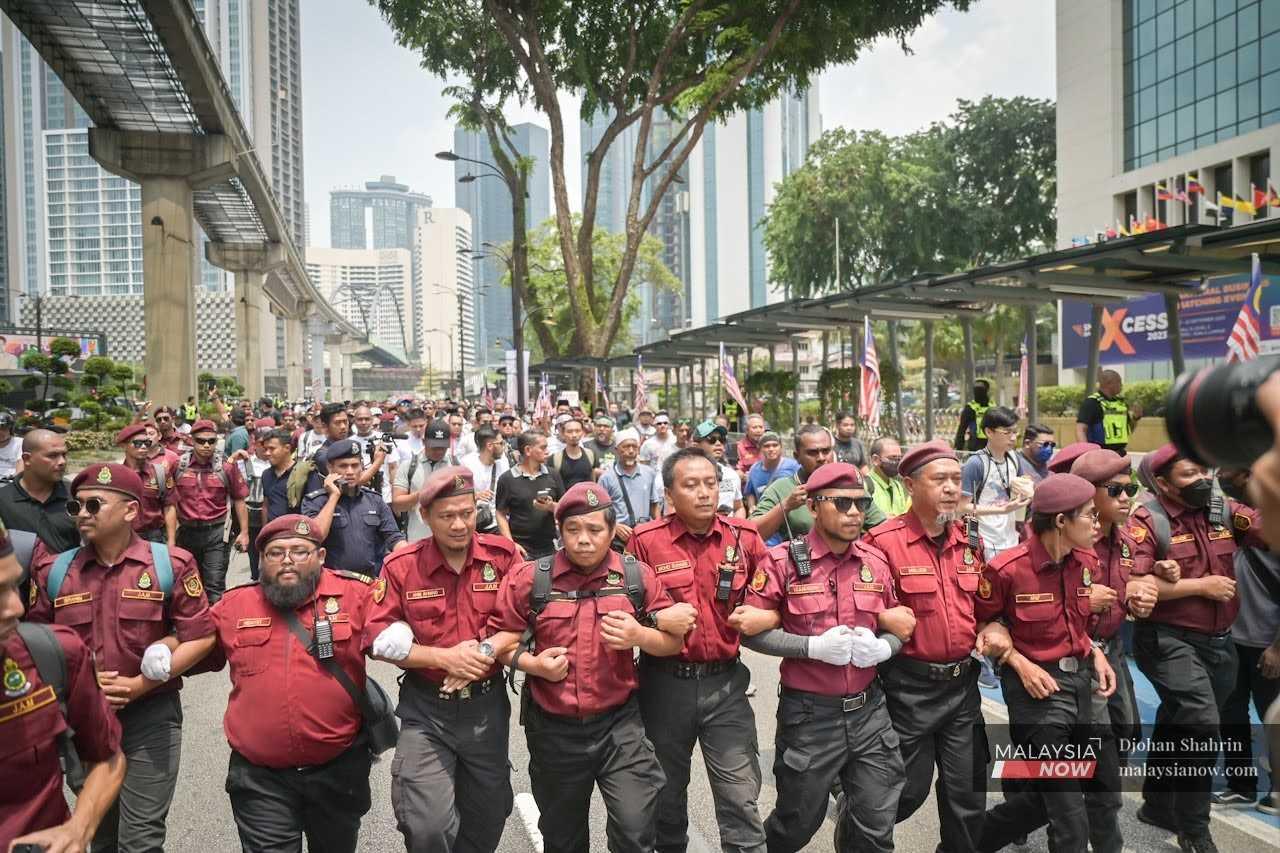





No comments:
Post a Comment